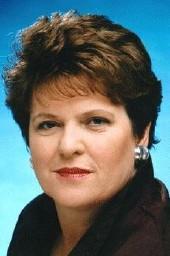Jenny Shipley (First Female Prime Minister of New Zealand)
 Dame Jenny Shipley, DNZM (born 4 February 1952), served as the 36th Prime Minister of New Zealand from December 1997 to December 1999.
Dame Jenny Shipley, DNZM (born 4 February 1952), served as the 36th Prime Minister of New Zealand from December 1997 to December 1999.
She was the first woman to hold this office and the first, and to date only, woman to serve as leader of the National Party of New Zealand.
Shipley was born as Jennifer Mary Robson in Gore, New Zealand, one of four sisters.
After attending Marlborough Girls' College, she gained qualification in 1971 as a teacher, and taught in New Zealand primary schools until 1976.
In 1973 she married Burton Shipley, and settled in Ashburton. She also assisted in a number of educational and child-care organisations, such as the Plunket Society.
Having joined the National Party in 1975, Shipley successfully stood for the Ashburton electorate in the 1987 election, entering parliament at age 35, at the time one of parliament's youngest members.
She would represent this electorate until her retirement from politics in 2002, though it was renamed Rakaia in 1990.
When National under Jim Bolger won the election of 1990, Shipley became Minister of Social Welfare, having been National's shadow minister in that portfolio while in Opposition. She also served as Minister of Women's Affairs.
In her role as Minister of Social Welfare, Shipley sparked controversy with her cutbacks to state benefits. Later, when she became Minister of Health in 1993, she caused further controversy by attempting to reform the public health service, introducing an internal market.
When National gained re-election in 1996, Shipley dropped the Women's Affairs portfolio and gained a number of others, including responsibility for state-owned companies and Transport.
Shipley grew increasingly frustrated and disillusioned with the cautious pace of National's leader, Jim Bolger, as well as what she saw as the disproportionate influence of coalition partner New Zealand First. She began gathering support to replace him in mid-1997.
Later that year, while Bolger attended the Commonwealth Heads of Government Meeting, Shipley convinced a majority of her National Party colleagues to back her bid for the leadership. Bolger, seeing that he no longer had the support of his party, resigned, and Shipley replaced him. As leader of the governing party, she became Prime Minister on 8 December 1997.
Despite continued economic growth, the Shipley government became increasingly unstable. In particular, the relationship between National and New Zealand First deteriorated. While Bolger had been able to maintain good relations with New Zealand First, and its leader, Deputy Prime Minister Winston Peters, the alliance became strained after Shipley rose to power. Finally, on 14 August 1998, Shipley sacked Peters from Cabinet.
Peters immediately withdrew support for Shipley's government. However, several New Zealand First MPs wanted to continue the coalition. Led by deputy leader Tau Henare, they tried to oust Peters as party leader. When they failed, they left their party, either becoming independents or trying to form their own parties. Shipley gained sufficient support from these MPs to keep National in power.
On the same day Shipley unexpectedly backed Cultural Affairs Minister Marie Hasler's call for the New Zealand flag to be changed. Shipley, along with the New Zealand Tourism Board, backed the quasi-national emblem of the silver fern on a black background as a possible alternative flag, along the lines of the Canadian Maple Leaf Flag, however she took pains to publicly disassociate herself from Bolger's republicanism.
As the debate continued in 1999 the Princess Royal visited New Zealand, and Shipley stated "I am an unashamed royal supporter, along with many New Zealanders." However, the debate was muted by the controversy surrounding Tourism Board contracts going to the public relations firm Saatchi and Saatchi, whose World CEO Kevin Roberts, also an advocate of the silver fern flag, was a good friend of Shipley.
Shipley was the first New Zealand Prime Minister to attend the gay and lesbian Hero Parade. She was the first National Party leader to seek to make electoral overtures to the gay and lesbian voting public. This was part of Shipley's expressed desire to expand the traditional National Party voting base.
Shipley is a member of the Council of Women World Leaders, an International network of current and former women presidents and prime ministers whose mission is to mobilize the highest-level women leaders globally for collective action on issues of critical importance to women and equitable development. She is also a member of the Club of Madrid.
In the 1999 election, the Labour Party, led by Helen Clark defeated the National Party. Shipley continued to lead the Party until October 2001, when Bill English took over the leadership and the role of Leader of the Opposition, and she subsequently retired from Parliament.
Shipley suffered a heart attack in 2000.
In 2007, Shipley joined the financial services firm Source Sentinel. She also has business interests in China and heads the board of the China Construction Bank. In 2010 the China Construction Bank agreed to help finance a proposal to invest in the New Zealand dairy industry.
She appeared on an episode of the television reality/travel show Intrepid Journeys where she visited Namibia. She later started a charity to help a school she came across as part of that trip.
Shipley accepted a damehood on 14 August 2009 after the Fifth National Government reinstated them. As of 2010 Shipley chairs Genesis Power Limited.